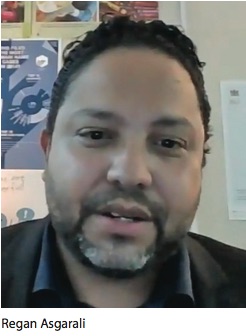IP Controller Regan Asgarali headlines UWI virtual lecture on film and other creative rights

The creative community in Trinidad and Tobago (and the Caribbean at large) is vast and diverse. Our culture and art forms have a unique signature that is recognisable around the world. But are our creatives aware of their rights when it comes to the intellectual property of the work they produce? In the digital age, where our connectivity is more online than ever before, especially with the COVID-19 pandemic, this is a vital question. The UWI Film Programme, the UWI Intellectual Property (IP) Help Desk and the Alma Jordan Library (AJL) recently hosted an Intellectual Property virtual lecture on April 15 entitled “Creatives and Intellectual Property – Take 2”, highlighting intellectual property in the Orange Economy to help creatives (particularly those in the film industry) navigate this legal maze.
Mr Regan Asgarali, an attorney-at-law attached to the Intellectual Property Office of Trinidad and Tobago as the Controller of Intellectual Property (and an alumni of the Faculty of Law at The University of the West Indies), was the featured speaker. Mr Asgarali outlined the basics of trademarks, copyright and neighbouring rights, all focused on the many facets of the film industry but relevant to a wide range of creative media. These creative “goods and services” like film, games, fashion, music and performing arts, are what encompass the “Orange Economy”, and unlike many industries right now, this economy is in a period of growth.

One thread that remained constant throughout the presentation was the vastly different landscape we have before us now than any generation previously, thanks to technology. As Asgarali noted, the “streaming revolution” of the last ten years has changed the face of intellectual property rights. “Your Instagram page is now very critical because that is where your fans go to get real-time updates. Social media influencers are now replacing traditional forms of publishing in advertising agreements.”
Alongside his explanation of traditional copyright terms and information, he also highlighted the way digital media has affected creators and the laws that protect them. “As you build your brand, you can exploit your brand through licensing opportunities,” said Mr Asgarali, who laid out the different ways creators could both protect and leverage their rights to create revenue streams like corporate sponsorship or product placements.
The IP Help Desk was launched in 2018 to provide the campus community with free access to education, information, training and advisory services in the field of IP. Ms Georgia Alexander, a librarian at the Alma Jordan Library and a key member of the IP Help Desk Team, also spoke briefly at the lecture, saying that, “We want to continue this as an annual series for our students. It’s such a broad yet intricate area, and there are many opportunities to enhance your knowledge via WIPO [World Intellectual Property Organisation] and the Trinidad and Tobago Intellectual Property Office (TTIPO). There are free courses online if you go to the WIPO site, so you can build your capacity in this area.”
For the creative community, these resources can make a big difference to managing the IP side of creative work, especially during this pandemic, when the arts are so needed and yet continuously underfunded.
The lecture is currently available on The UWI St Augustine Film Programme and AJL Facebook pages, and any additional information can be found by emailing the Help Desk at intellectualproperty.helpdesk@sta.uwi.edu to schedule a virtual consultation with an IP consultant via Zoom.